|
“Peter and his companions had been overcome by sleep, but becoming fully awake, they saw his glory and the two men standing with him.” -Luke 9:32 Twice in the Gospels we hear of the trio of disciples sleeping at pivotal moments in Christ’s life and ministry: at the Transfiguration – in this Sunday’s Gospel – and in the Garden of Gethsemane during Christ’s Agony. Both times, Christ is in deep prayer. And both times, Peter, James, and John are “overcome by sleep.” I get it. The group of men have just hiked up a mountain. It would have been normal to rest after such a grueling endeavor. Similarly, in the Garden, Jesus took the three disciples to pray after the Feast of the Passover—a long, filling meal complete with wine. I think of all the times I’ve napped after a holiday meal and sympathize with Peter, James, and John. In these scenes, they are so human. They become tired and rest their eyes. And yet, because of their physical tiredness, they miss out on God’s glory. In this week’s Gospel for the Second Sunday of Lent, Jesus is transfigured and his three beloved disciples are offered a glimpse of the glory to come—not only the glory of the Resurrected Christ, but the glory that awaits all men and women who allow themselves to be transformed by his grace. This Lent, I find myself asking, “Am I asleep with his disciples? What’s causing me to shut my eyes to God’s glory?” These questions are what have guided my Lenten journey as I discern how to grow in holiness this season. Each year, the Church in her wisdom asks us to reflect on what is making us spiritually sluggish and helps us prepare for Easter through prayer, fasting, and almsgiving. By ramping up in these three Lenten tenets, we can grow in our ability to see God’s will and the Holy Spirit at work in our lives. Had the Apostles been awake throughout the entirety of Christ’s Transfiguration, they would have basked longer in this glory—fear and confusion would not have gripped them. Lent calls us to wake up, to be alert, not only for the Easter celebration, but for God’s invitation to greater holiness throughout our lives. Pope Francis highlights Lent as the continuation of the “journey of conversion.” This journey is a lifelong one. And yet, seasons such as Lent, which focus on an even greater attention to prayer, fasting, and almsgiving, often spur us deeper and further on this journey towards Christ. As Pope Francis encouraged in his 2019 Lenten message: Let us not allow this season of grace to pass in vain! Let us ask God to help us set out on a path of true conversion. Let us leave behind our selfishness and self-absorption, and turn to Jesus’ Pasch. Let us stand beside our brothers and sisters in need, sharing our spiritual and material goods with them. In this way, by concretely welcoming Christ’s victory over sin and death into our lives, we will also radiate its transforming power to all of creation. The goal of Lent is not only Easter, but Christ Himself. This Lent, may our participation in prayer, fasting, and almsgiving help us shake off the drowsiness that shuts our eyes to God’s glory. For more resources to accompany you throughout your Lenten journey, please click here. Questions for Reflection: Am you asleep with Christ's disciples? What’s causing you to shut your eyes to God’s glory?” **This blog was originally published on March 12, 2019.**
0 Comments
We walk amidst the shadows and call them life. We’re so accustomed to the dimness of this world that light is too abrasive. It burns rather than warms, offends rather than illuminates. We stumble around in the fog, thinking we are dancing. It’s like looking in the mirror and confusing the reflection with the person. Many things prevent us from truly seeing ourselves—from knowing who we are, from where we’ve come and where we are going. We’ve convinced ourselves that we are comfortable. “Comfortable” is our best friend. It doesn’t demand much of us, doesn't pry, doesn’t ask us to change. It leaves us quite alone, minds its own business. Comfortable—a makeshift refuge amidst the vast discomfort of the world we face each day. Comfortable—the often elusive goal of our lives. Comfortable—a concession to a fate that is not our true end.
Peter, James and John were comfortable in their lives before a rabbi from Nazareth invited them to drop everything and follow him. Their lives were not inherently sinful; their occupations were worthy. Life seemed good. These men were comfortable until they met the Christ who called them to something more. While the high calling Christ invited these men into was glimpsed throughout Jesus’ entire ministry, it is most fully revealed on earth in an apocalyptic way in the Transfiguration of Christ. As the Gospel tells us, soon after Peter’s profession of Jesus as the Messiah, Jesus takes Peter, James and John to the top of Mt. Tabor. Once there, Jesus is transfigured before them, “his clothes became dazzling white. Then Elijah appeared to them along with Moses, and they were conversing with Jesus (Mk 9: 3-4). His apostles are terrified. They have seen something almost greater than they could physically behold. Next, they hear the words of God the Father, “This is my beloved Son. Listen to him” (9:7). They have been confronted by light, the Eternal Light of God himself, and are roused out of any makeshift comfort they had created for themselves. The apostles were uncomfortable, puzzled, amazed. What does the Transfiguration tell us? First, that this luminous state is our destiny. As baptized Christians, we are called to be fully transfigured into Christ himself, shedding anything in our being that does not reflect his light and love. This capacity is already within us, though we diminish it with sin. Second, the Transfiguration shows us that comfortable is not enough. It is neither the goal of the Christian life, nor what we were made for. The Transfiguration instead shows us that we were made for greatness and excellence even amidst the discomfort of our world. We were never made to settle, just as we were never made for the fog, darkness or failure many people accept as daily life. Instead, Christ invites us to love. The Transfiguration is a testament to this love, for this transfigured destiny is only made possible because of his sacrifice of love on the cross. The Transfiguration is pure gift and mercy. And we can begin to be transfigured now, today. To be transfigured, we are called to imitate Christ’s love. This is an uncomfortable love that demands all of who we are. It is love that evaporates our egotism, that hurts, that pushes us out of ourselves and into the lives and well-being of others. Love that we have to practice, and will fail at, again and again. Love that is, and will be, crucified. But love that is worth it. Love that reminds us who we are and why we’re here. Love that takes us from the shadows and actually calls us to dance. Love that breaks through the fog and never diminishes. Love that is the true light. Love that transfigures. As today’s reflection from Magnificat says, “The Savior begs: ‘Become what you behold!’” **This post was originally published on 8/6/2015**
The ashes of our Lenten journey were more pronounced this year—not fading with Ash Wednesday but thickening in the following weeks with the outbreak of COVID-19. Each of the plans we had for Lent—the sacrifices, the resolutions, the acts of charity—were rearranged, making room for more sacrifices than we thought possible. We sacrificed control, physical freedom, the assurance that our pantries would be stocked or that our bank accounts would be replenished. We sacrificed our physical friendships, birthday celebrations, anniversary milestones, family vacations, date nights. We’ve lost friends, family, or neighbors to a virus that until a few months ago was hardly known about or discussed. We’ve sacrificed our liturgical lives, being able to receive Christ’s Body and Blood in the Eucharist, attendance at weddings or baptisms, pastoral formation, the journey into the Church on Easter via RCIA. Pope Francis likens this pandemic to the evening storm experienced by the disciples in the boat, saying, “For weeks now it has been evening.” This evening has been long, dark, full of the unknown. Throughout this “evening,” we have had to confront our vulnerabilities and experience our littleness. We’ve had to realize that without light, we cannot see. Perhaps we’ve grappled with fear in this darkness—a fear of the unknown, a fear of isolation, a fear that the dawn may never come. Perhaps our minds have been left to imagine: Lord, “Do you not care that we are perishing?” This time of quarantine, social distancing, and pandemic has been our evening storm which, “Exposes our vulnerability and uncovers those false and superfluous certainties around which we have constructed our daily schedules…shows us how we have allowed to become dull and feeble the very things that nourish, sustain and strengthen our lives and our communities… [and] lays bare all our prepackaged ideas and forgetfulness of what nourishes our people’s souls.” We thought “we would stay healthy in a world that was sick,” but the storm has awakened us from our personal slumber. And we need light. This realization is the seed of faith—a faith which recognizes the need for salvation, for one another, for the light of God. The realization of our littleness, our helplessness, our dependence, our mortality, is the perfect place from which to enter into the Triduum and await the lighting of the Easter candle—the Resurrection of Jesus Christ. God has provided flickers of hope, reflections of grace, throughout our journey at sea: livestreams of Masses, daily Scripture reflections, broadcasts of Adoration, priests hearing Confessions in drive-thrus, virtual retreats, Pope Francis’ blessing of the entire world. We have seen a “creativity of love”--the production of ventilators in car factories, the making of masks in workplaces, the donations of money, food, and supplies across the world, the video chats to those in quarantine facing death alone. We see dancing from porch balconies. Teddy bears in windows. Embraces in hospitals. Birthday drive-bys with signs and honking. People on their knees. Yes, the light of Christ exists even in the darkness. And the darkness has not, and will not, overcome it. It will shine ablaze all the more radiantly this year in the midst of our utter darkness, sparkling in the gloom. The darker the night, the better able we are to see the light. And in the darkness, we look up. Let us welcome the light of Christ this Easter by first lighting his love in our hearts. When Christ’s life lives within us, we can enkindle it in the souls of others and set alight all we encounter. “Prayer and quiet service: these are our victorious weapons,” Pope Francis reminds us. Wake up, Lord! The disciples shouted in the midst of the storm. Wake up, Lord! The world shouts again today. Let us awaken the Lord through our prayers and service. Through our acts of charity to those suffering, tired, or scared. Through our cries and supplications. Through our fasting in these unwelcome sackcloths and seemingly perpetual ashes. Cry out with me again this Triduum, “Wake up, Lord! We are perishing.” Christ’s response to our cries this week is open arms embracing us through nails and scourging. His response to our cries is a head beaten, bruised, and crowned with thorns. His response to our cries is silence to jeers, taunts, mockery, and abandonment. His response to our cries is the relinquishing of his spirit in atonement for our sins and those of the whole world. He who cried out to his Father, “my God, my God, why have you forsaken me?” also knows the darkness intimately. He knows what it feels like to be alone and perishing. But by his words do we find the light: “Why are you terrified? Do you not yet have faith?” ….“My Father…not as I will, but as you will.” Our cries are never unheard. “The Lord awakens so as to reawaken and revive our Easter faith,” Pope Francis said. “We have an anchor: by his cross we have been saved. We have a rudder: by his cross we have been redeemed. We have a hope: by his cross we have been healed and embraced so that nothing and no one can separate us from his redeeming love.” The goal of our Lenten journey is transformation—to be transfigured. This is also our prayer throughout this pandemic. Yes, we pray that it ends, that healing comes, that daily life can resume, that economies will be restored, and that suffering will cease. But even more than all of that, we pray for transfiguration. Because when we are transfigured by the love and light of Christ, when our faith has awakened and we have realized our need for salvation, then the storm can rage on while we rest knowing we will not perish—for we will know deep in our hearts that with the “dawn there is rejoicing.” Then, and only then, “In the silence of our cities, the Easter Gospel will resound.” For more Easter and Lenten resources, please click here. For more resources and reflections on COVID-19, please click here. On March 7, my husband threw a surprise party to celebrate my 30th birthday. That would be the last time I would physically spend with many dear friends for at least a month. It was at the beginning stages of the coronavirus pandemic when the United States seemed to just barely be grasping what was going on across the Atlantic. We were aware but unafraid. The virus was like the flu. It only affected the elderly and those with compromised immune systems. It wasn’t a big deal. We would be fine. But around that time, my family began to take the notions of staying home, social distancing, and self-quarantining seriously. Each day brought more news. So we spent time outside. We tried to stay 6 ft apart. We bought a few more groceries than usual. We began to lay low. Almost three weeks later, I write from home, having gone “out” less times than I can count on my fingers apart from family walks, romps to open fields, or our backyard. No grocery stores. No movie theaters. No social events. No playgrounds. No libraries. No stores. No Masses. I haven’t had to “try” to make Lent this year somber or serious. Every day is a fast from something I deemed important to my life: a fast from physical friendship; a fast from community in the way I’m used to living it; a fast from outings, from the sheer independence of being able to step out of my house and go where I want to go when I want to. This fasting has been humbling. Prayer is the rhythm to my day. It is the breath of my days. The heartbeat. I watch online daily Masses or reflections on the Scriptures. I pray the rosary by myself or with my husband and children. I sing the Divine Mercy chaplet. I continue a novena. I make a spiritual communion with tears in my eyes. I utter supplications for others throughout the day. I offer my fasts—both the voluntary and involuntary—for our world. At the beginning of this Lenten journey, I shared how I thirsted to emerge from spiritual mediocrity. Now I thirst for God himself. I yearn to join the Body of Christ once again in the sacraments and receive him at the Eucharistic table. I live Paul’s exhortation to pray without ceasing in a profound way. And yet God has been so good. And peace prevails in my heart. I have so much to be thankful for: continued jobs and paychecks, long days of sunshine and warm weather, our health, food on our plates, a roof over our heads, snuggles with my children, reading books in our indoor tent, video calls with friends and family all over the country. In spite of everything, we are together. In spite of everything, God is here. In spite of everything, there is always hope. Let us continue to “rend our hearts” this Lent by turning to God and giving him everything we are feeling right now: exhaustion, confusion, anxiety, disillusionment, anger, despair, or fear. We can approach the one who became a vulnerable child for us and give him our own insecurities and vulnerabilities. At the manger, we will be met with his never-ending love. In his homily for the fourth Sunday of Lent, Fr. Mike Schmitz noted that God did not make an unbreakable world. Though he created perfectly, he instilled in mankind the ability to have free will—the ability to break our relationship with God by introducing sin into the human condition. Death, pain, suffering, temptation—all is the result of sin. This pandemic is more evidence of this truth. What matters, however, in the midst of our suffering, is that God does not abandon us to it—nor has he ever. Scripture recounts the story of God’s unfailing love for humanity since the Fall—a story of salvation that continues personally with each of us today. God does not promise fulfillment on earth, perfect joy, blessing, and comfort. He promises the cross, daily. But he also promises us that he will be with us always—even to the end of time—that he came to give life in abundance, that we can be transfigured, and that there is resurrection. He invites us to complete satisfaction and joy with him in Heaven for eternity. And in the meantime, as we continue on our own personal journeys in this “vale of tears,” he remains waiting for us at the well. Inviting us on the shore. Looking for our return on the horizon. Feeding us at the table. He remains pouring out all for us on the Cross. He remains. As we continue to navigate this Lenten season, the coronavirus pandemic, and the approach of Easter, let us go to him with humble hearts. “Let us allow ourselves to be loved, so that we can give love in return. Let us allow ourselves to stand up and walk towards Easter. Then we will experience the joy of discovering how God raises us up from our ashes.” -Pope Francis (Ash Wednesday Homily, 2020) “Peter and his companions had been overcome by sleep, but becoming fully awake, they saw his glory and the two men standing with him.” -Luke 9:32 Twice in the Gospels we hear of the trio of disciples sleeping at pivotal moments in Christ’s life and ministry: at the Transfiguration – in this Sunday’s Gospel – and in the Garden of Gethsemane during Christ’s Agony. Both times, Christ is in deep prayer. And both times, Peter, James, and John are “overcome by sleep.” I get it. The group of men have just hiked up a mountain. It would have been normal to rest after such a grueling endeavor. Similarly, in the Garden, Jesus took the three disciples to pray after the Feast of the Passover—a long, filling meal complete with wine. I think of all the times I’ve napped after a holiday meal and sympathize with Peter, James, and John. In these scenes, they are so human. They become tired and rest their eyes. And yet, because of their physical tiredness, they miss out on God’s glory. In this week’s Gospel for the Second Sunday of Lent, Jesus is transfigured and his three beloved disciples are offered a glimpse of the glory to come—not only the glory of the Resurrected Christ, but the glory that awaits all men and women who allow themselves to be transformed by his grace. This Lent, I find myself asking, “Am I asleep with his disciples? What’s causing me to shut my eyes to God’s glory?” These questions are what have guided my Lenten journey as I discern how to grow in holiness this season. Each year, the Church in her wisdom asks us to reflect on what is making us spiritually sluggish and helps us prepare for Easter through prayer, fasting, and almsgiving. By ramping up in these three Lenten tenets, we can grow in our ability to see God’s will and the Holy Spirit at work in our lives. Had the Apostles been awake throughout the entirety of Christ’s Transfiguration, they would have basked longer in this glory—fear and confusion would not have gripped them. Lent calls us to wake up, to be alert, not only for the Easter celebration, but for God’s invitation to greater holiness throughout our lives. Pope Francis highlights Lent as the continuation of the “journey of conversion.” This journey is a lifelong one. And yet, seasons such as Lent, which focus on an even greater attention to prayer, fasting, and almsgiving, often spur us deeper and further on this journey towards Christ. As Pope Francis encouraged in his 2019 Lenten message: Let us not allow this season of grace to pass in vain! Let us ask God to help us set out on a path of true conversion. Let us leave behind our selfishness and self-absorption, and turn to Jesus’ Pasch. Let us stand beside our brothers and sisters in need, sharing our spiritual and material goods with them. In this way, by concretely welcoming Christ’s victory over sin and death into our lives, we will also radiate its transforming power to all of creation. The goal of Lent is not only Easter, but Christ Himself. This Lent, may our participation in prayer, fasting, and almsgiving help us shake off the drowsiness that shuts our eyes to God’s glory. For more resources to accompany you throughout your Lenten journey, please click here. Questions for Reflection: Am you asleep with Christ's disciples? What’s causing you to shut your eyes to God’s glory?” I remember sharing an odd insight with my fiancé as we walked briskly up to the cathedral where we would soon be married. “This is going to be hard,” I said, referring to marriage. This might have caught most people off guard. It’s not common for a young, blissful couple about to embark on a lifelong journey of commitment to think about its difficulty. I didn’t know at the time how true these words were, only that they were necessary for understanding some of the implications of any lifelong commitment. It’s a lot easier, and a lot more enjoyable, to think about all the beauty involved in marriage: visions of your spouse bringing you breakfast in bed, selflessly offering to do the laundry, bringing home flowers “just because,” going on countless adventures, experiencing the thrill of starting a family, buying homes, building careers, and doing it all as a team, forever. In February, the United States celebrates love on Valentine’s Day. The Church celebrates a form of love as well, with February 7-14 being National Marriage Week in the US and February 10 being World Marriage Day. Celebrations of love are appropriate and beautiful, but I think we do love and marriage an injustice if we only celebrate what we consider to be positive and only on certain days. My husband and I continue to learn—after three years of marriage and two children—that true love is sacrifice. More romantic to me than any bouquet is my husband getting up early with one of our sons, taking the trash out, or working to improve our almost 100-year-old home. The moments when he gives of himself in quiet ways are what make marriage beautiful. And our journey of learning the selfless love Jesus modeled for his disciples is a lifelong one. We are learning we must choose to love each other after being woken up 3 or 4 times a night, after 2 hour-long commutes a day, after changing countless diapers, mediating children’s fights, trying to solve the latest home issue, and working on a budget. This--this is what makes marriage hard: the choice to give of oneself in the midst of imperfect and less than ideal circumstances. This is the tip of what I meant that day when I told my husband that marriage would be hard. I didn’t know all the details, just that it was a reality we would need to grapple with in the years to come. Pope Francis speaks often of the realities of marriage throughout his preaching. He said in one homily that marriage is not fiction, acknowledging that “the path is not always a smooth one, free of disagreements, otherwise it would not be human…It is a demanding journey, at times difficult, and at times turbulent, but such is life.” I love that he is so down to earth and realistic in his observations. Yes, marriage is sacred and beautiful and designed by God. But it is also hard work, something I think may need to be more addressed in our culture – especially today when this lifelong commitment seems less and less possible. The fact that marriage is hard is not cause for fear, despair, or surrender. The fact that it’s hard means your marriage is normal and human. Simply because it is comprised of two people with past hurts, wounds, weaknesses, and imperfections, marriage will always be complicated. But it is within the context of a lifelong commitment that these wounds and imperfections can be transfigured. This is the beauty of marriage: when seen in the light of the eternal, it enables each person in the relationship to be sanctified. What transfigures marriage is prayer, grace, and, yes, hard work. Marriage is the daily choice to give of oneself, to surrender, to submit mutually to one another. As the Catechism of the Catholic Church notes, “After the fall, marriage helps to overcome self-absorption, egoism, pursuit of one's own pleasure, and to open oneself to the other, to mutual aid and to self-giving” (CCC 1609). Pope Francis has made note of this as well, saying that a healthy marriage requires the mutual gift of self and the grace of Christ. In a dialogue with engaged couples on Valentine’s Day in 2014, Pope Francis advised those present to entrust themselves “to the Lord Jesus in a life that becomes a daily spiritual journey, made up of steps – small steps, steps of joint growth – made up of the commitment to become mature women and men in the faith.” He continued, “The more you entrust yourselves to Him the more your love will be ‘forever,’ capable of being renewed and it will overcome every difficulty.” As we continue to reflect on love and marriage in our culture, let us remember that this call to love is not reserved for married couples, but for all Christians. Every act of service and sacrifice made for others is the living out a life of discipleship. Love is hard. But the same Christ who knelt before his disciples and washed their feet, the same Christ who multiplied the wine at the Wedding Feast at Cana, enables us to live this love as we pick up our crosses, daily, to follow him. Let us entrust ourselves and our relationships to the Bridegroom who makes all things new. Question for Reflection: How can you practice the sometimes difficult love Christ calls us to in your life today? For more resources on Marriage and Family, please click here. But he said to them, "Unless I see in his hands the print of the nails, and place my finger in the mark of the nails, and place my hand in his side, I will not believe." -John 20:25 During this beautiful liturgical season of rejoicing in the Resurrection of Our Lord, I always find this particular passage about “Doubting Thomas” extremely important to stop and reflect upon. After weeks and weeks experiencing the desert of Lent, the Passion on Good Friday, and the somber waiting on Holy Saturday, we celebrate the Father’s goodness, His promise fulfilled, His Son glorified on Easter Sunday! Praise Him, for “by his wounds we are healed.” (Isaiah 53:5) On the Sunday when the Gospel passage about Thomas is proclaimed, I tend to sympathize with the “doubting” disciple. Thomas was not there the first time Jesus appeared to the disciples. I resonate with Thomas’s human response of needing to touch the side of the Lord in order to believe. What strikes me about Thomas is his initial understanding that the Resurrected Lord would have His wounds. Why did Thomas believe the Lord in His glory would still be wounded? I find myself thinking of the Lord in His glorified body as “perfect,” without blemish, without the aftermath of pain, with every scar from Good Friday completely gone. Thomas, however, needed to see evidence from the Lord’s action on Friday for the sake of belief. Thomas came to know the Risen Lord through His wounds. Do you fall into the same temptation that I do, that resurrection means pain and suffering will be completely dispelled and erased, as if it never happened? This is not how the Lord comes in His glory. Jesus returns with His wounds, glorified, resurrected, transfigured. In fact, Jesus’ wounds were necessary for the increasing of faith for His disciples. Christ takes on the burden of our sins in order to overcome them. He conquers man’s greatest foe, death itself, and invites us to eternal life. The scars and wounds Christ shows Thomas give testament to this truth. The pain of Good Friday brings the sweetness in the joy of the Resurrection on Easter Sunday and thereafter. How does this apply to our lives? Are you struggling with something you see little hope in? Do you find yourself asking the Lord for a different cross? Just as Jesus’ wounds and sufferings are glorified, so shall ours be if we turn them over to God. We can be sure then that our own struggles, crosses, and sufferings will be brought to glory, not forgotten, but resurrected. Our particular areas of pain can bring others to the glory of Jesus Christ! Let us ask St. Thomas to help our unbelief and truly live in the hope of the Resurrection. “Each man in his suffering can also become a sharer in the redemptive suffering of Christ.” –St. John Paul II, Salvifici Doloris Question for Reflection: How can the story of “Doubting Thomas” increase your faith? Have there been times in your life when you, too, need to see in order to believe? In my Bible study, we are reading through the Second Letter to the Corinthians from St. Paul. The last session covered Chapter Five. It deals with the current and future destiny of our bodies. For we know that if our earthly dwelling, a tent, should be destroyed, we have a building from God, a dwelling not made with hands, eternal in heaven. In verse one, Paul says our earthly dwelling is a tent. What is the tent? Even in his day, most people didn't live in tents. They had stone or wood houses. Clearly that can't be what Paul meant. In fact, he is referring to the earthly body as a tent, and the heavenly body as a building. In the Old Testament, the Israelites traveled with the Holy of Holies, the place where the Presence of God was pleased to dwell in a special and unique way, in the form of a tent structure. It's portable, appropriate for a sojourning people. When they finally reached the Promised Land, King Solomon built the Temple out of stone and precious metals. It was a structure of permanence and stability; it declared this is where God is and He isn't moving. A tent is a much flimsier home than a stone building. Yes, they are both dwelling places, but stone is harder to destroy than cloth, and more secure. There is, to borrow a phrase from Alice in Wonderland, a muchness to stone, a weight and solidity that tents don't have. In the Transfiguration scene in Luke 9: 28-36, Jesus' face and clothing are changed. Scholars take this to mean that we will have our same bodies, the one the soul is united with right now as you read these words, for all eternity. For better or worse. In Heaven, the body shall be glorified and refined, receiving a muchness that we don't have now. In Hell, the body shall be as damned as the soul, in anguish just as fitting. In the ancient world, this concept of retaining your physical body after death would have been flabbergasting. Most philosophical traditions saw the body as something other than the true self. It was something to be punished, or used for mere pleasure, but importantly gotten rid of, so the spirit-self could be free. Christianity says otherwise. We, human beings, are body-soul composites. Matter and spirit united into one creature. And that is good. If we were pure matter, we would be like the inanimate universe, or at best like animals. If we were pure spirit, we would be angels. We are neither. We are a unity of the two most opposite things in the universe, and God looks at us and says we are good. There is a reversion of thought in our modern world that reflects the ancients: either the body doesn't matter at all and I just need to get rid of it because it's not really me, or it's all that matters because there is nothing else to me. It's sneaks into Christian minds as well. Which is devastating, on the psychological and spiritual levels. We should have a sense of home-ness in our bodies. Have you ever met someone who just seemed uncomfortable in their own skin? As if they didn't know what to do with themselves? Have you ever been that person? We're often expected to get our act together. Be confident. Act normal. Own yourself. But you can't own selves, yours or anyone else's. That is a mask. And a mask is not a home. Think now of the people whom you've met who were so solid and real and, in a word, themselves, that you felt comfortable enough to be yourself. Think of the people whose houses you walk into and sigh with peace and the knowledge that you are loved. Think of those whose arms embrace you and tell you it is good to be alive. One of the best ways to love others is to love yourself. Treat yourself with dignity and respect. The Christian is commanded to love as Christ loved, and thus has the duty to be a holistically integrated human being more so than the rest of society. Be at home in your own skin, and allow others to be home in their own existence. We want visitors and guests to feel welcome in our homes, don’t we? Well, they can't unless we do; stability and hospitality begin in the heart. These virtues start to grow when we allow ourselves to become integrated and united, when all of our being is directed and following one Way with all your heart, with all your mind, with all your strength, and with all your soul.
A few years ago, I was backpacking through the desert of northeastern New Mexico. On one particular day, we were going to climb the tallest mountain of our trek, Baldy Mountain, at an elevation of 12,441 feet. As we got higher, the climb became more difficult with thinning air and more challenging terrain. As we neared the summit, I ended up in front of the crew. Just as we reached the summit, our crew leader, Jordan, literally gave me the final push to the top. At that moment, we were on top of the world and gleaming with joy! While on the mountaintop, we could see for miles. As we reveled, I paused and said a quick prayer of thanksgiving. One couldn't help but be amazed at God's great creation. As we rested, having a quick snack and some water, we saw some storm clouds starting to roll in and were forced to descend quicker than anticipated. Eventually, we would finish our 110 mile trek—with Baldy Mountain being one of the greatest highlights.
Whenever I hear the story of the Transfiguration, my mind immediately goes to this time in the mountains. Because of this experience, I feel as though I have walked with Peter, John, and James. At the moment I reached summit, I caught a glimpse of the glory of God. I saw a small part of the transfiguring power of Jesus. I went from a hiker to a pilgrim in a matter of seconds. My trek now had a greater significance. It was no longer just a physical challenge, but one that would cause me to go on a religious quest in God's great creation. This is what I see in last Sunday's Gospel, which is a reminder of the splendor of Jesus. Usually by this point in Lent, I am more concerned about avoiding the things I have given up and less on Jesus. The Transfiguration is a reminder of why we enter the Lenten season: to see the face of Jesus. He helps us transfigure ourselves into being more loving, more merciful, and more perfect humans. If we look at the beginning of Chapter 9 of Luke, Jesus gives his mission to the Apostles. He tells them to go out and proclaim the Good News. It is after the Transfiguration that he reveals more of his glory. We, too, have the same experience. These experiences come in a number of different ways. They are often brief personal moments that can happen anywhere. Personally, I often find them in interactions with individuals. It can be serving the poor, being with a friend during a difficult time, or smiling at a stranger in the grocery store. From the moment of our baptism, we are sent out into the world as apostles and then along the way we consistently experience his glory. This encounter can happen anywhere and at anytime. I also appreciate Peter's role in this Gospel. Rather than being amazed at the splendor of Christ and the conversation between him, Elijah, and Moses, Peter suggests they pitch tents for the three. Doing so would completely defeat the purpose of the meeting. His transfiguration is an affirmation of his identity as the Messiah and is meant to show how Jesus is the fulfillment of the Old Testament. I often find that I say something at the wrong place or time. That is exactly what Peter does here. He means well, but doesn't see what is in front of him: the glory that Jesus has revealed. In his humanity, Peter often does this, yet Jesus still loves him. Especially during the Year of Mercy, we need to be reminded that we, too, can be like Peter and that is okay. We often don't see the splendor in front of our eyes. But we know that we are loved by God, who is the Infinite Love. When we invite God to enter our hearts, we can see the spender of God. Like the patron of the Catholic Apostolate Center, St. Vincent Pallotti, said "Seek God and you find God. Seek God in all things and you will find God in all things. Seek God in always and you will always find God." As we go on this week, we should be looking in our own lives to see the transfiguring power of Christ. It may not be a major event, like last Sunday's Gospel, but in the small things. If we keep our hearts open this Lent we will find God anywhere. For more resources to accompany you on your Lenten journey, click here. We walk amidst the shadows and call them life. We’re so accustomed to the dimness of this world that light is too abrasive. It burns rather than warms, offends rather than illuminates. We stumble around in the fog, thinking we are dancing. It’s like looking in the mirror and confusing the reflection with the person. Many things prevent us from truly seeing ourselves—from knowing who we are, from where we’ve come and where we are going. We’ve convinced ourselves that we are comfortable. “Comfortable” is our best friend. It doesn’t demand much of us, doesn't pry, doesn’t ask us to change. It leaves us quite alone, minds its own business. Comfortable—a makeshift refuge amidst the vast discomfort of the world we face each day. Comfortable—the often elusive goal of our lives. Comfortable—a concession to a fate that is not our true end.
Peter, James and John were comfortable in their lives before a rabbi from Nazareth invited them to drop everything and follow him. Their lives were not inherently sinful; their occupations were worthy. Life seemed good. These men were comfortable until they met the Christ who called them to something more. While the high calling Christ invited these men into was glimpsed throughout Jesus’ entire ministry, it is most fully revealed on earth in an apocalyptic way in the Transfiguration of Christ. As the Gospel tells us, soon after Peter’s profession of Jesus as the Messiah, Jesus takes Peter, James and John to the top of Mt. Tabor. Once there, Jesus is transfigured before them, “his clothes became dazzling white. Then Elijah appeared to them along with Moses, and they were conversing with Jesus (Mk 9: 3-4). His apostles are terrified. They have seen something almost greater than they could physically behold. Next, they hear the words of God the Father, “This is my beloved Son. Listen to him” (9:7). They have been confronted by light, the Eternal Light of God himself, and are roused out of any makeshift comfort they had created for themselves. The apostles were uncomfortable, puzzled, amazed. What does the Transfiguration tell us? First, that this luminous state is our destiny. As baptized Christians, we are called to be fully transfigured into Christ himself, shedding anything in our being that does not reflect his light and love. This capacity is already within us, though we diminish it with sin. Second, the Transfiguration shows us that comfortable is not enough. It is neither the goal of the Christian life, nor what we were made for. The Transfiguration instead shows us that we were made for greatness and excellence even amidst the discomfort of our world. We were never made to settle, just as we were never made for the fog, darkness or failure many people accept as daily life. Instead, Christ invites us to love. The Transfiguration is a testament to this love, for this transfigured destiny is only made possible because of his sacrifice of love on the cross. The Transfiguration is pure gift and mercy. And we can begin to be transfigured now, today. To be transfigured, we are called to imitate Christ’s love. This is an uncomfortable love that demands all of who we are. It is love that evaporates our egotism, that hurts, that pushes us out of ourselves and into the lives and well-being of others. Love that we have to practice, and will fail at, again and again. Love that is, and will be, crucified. But love that is worth it. Love that reminds us who we are and why we’re here. Love that takes us from the shadows and actually calls us to dance. Love that breaks through the fog and never diminishes. Love that is the true light. Love that transfigures. As today’s reflection from Magnificat says, “The Savior begs: ‘Become what you behold!’” Kate Flannery is the Social Media Coordinator for the Catholic Apostolate Center. They bought into the lie—that nothing had changed, that their dreams were stifled, that death prevailed. The locked doors reflected their locked hearts. Like anyone, they were afraid, inconsolable, at the point of despair. Save one—a virgin. She continues to model to us today what it means to live faith, what it looks like to be a disciple.
The fear of the disciples in the upper room is understandable. They had abandoned the man whom they had left everything to follow for three years. The same man they had pledged to follow unto death had been tortured and killed as their backs were turned, as they cowered for their own lives. Their hopes of a restored Jewish kingdom, a glorious king from the line of David, freedom from Roman rule and the return of God’s presence to the Temple seemed to be nailed to a cross on Golgotha, laid in a tomb hewn from rock. They had yet to see God’s plan amidst the perceived failure. How could this be God’s plan? It was so unlike their own. Their fear is our own. It is the fear of unmet desires, of unworthiness, of death, of uncertainty, of perceived silence. Like the disciples, we often fail to see God’s plan in our lives. We look around in despair and sense that He is silent. We live the reality of death, confusion and suffering and say, “nothing good can come from this.” But as the disciples quickly realized, our ways are not God’s ways. Our wills are not yet one. Much stands in the way: selfishness, greed, egoism, materialism, pride. All changes with the coming of the Holy Spirit. What makes a law-abiding Jew abandon his persecution of Christians in favor of joining them and proclaiming the Christ to Jerusalem and Rome? What makes uneducated fisherman leaders of the universal Church and martyrs for the faith? What makes the son of a wealthy Italian merchant the begging founder of a religious order and a friend of the poor? What makes a cloistered nun in Lisieux a Doctor of the Church? What makes a German priest in Auschwitz volunteer to die in place of a father? What makes a modern day Italian mother and doctor offer her life for that of her child? The Advocate, the Holy Spirit. It is the Holy Spirit who is the game changer for the Church—what will now set the disciples apart from the whole world and what continues to set Christians apart today. The Holy Spirit is the active agent of conversion in man, the third person of the Trinity who opens up the Scriptures and sets our hearts on fire. It is the Holy Spirit who enables us to live our mission. The Holy Spirit, God’s love, is the difference between the fearful men in the upper room and the on-fire disciples of Christ preaching the Gospel and converting thousands in a single day. In the Gospel today, Jesus prays for his followers in the Garden of Gethsemane while also speaking directly to you and me. He prays for something seemingly impossible: “that they may all be one” as the Trinity is one. Christ speaks these words not to frustrate his followers but to call them to a perfection possible through God alone. He utters these precious words knowing he will be sending the Holy Spirit to enable man to do this. The goal is outward. This communion—the call to unity—must lead to mission: “that the world may know that you sent me and that you loved them.” God’s love is efficacious. It cannot be contained but must be proclaimed to the world. Only God could deign to give man so dignified and impossible a call. And only God could enable man to fulfill it. This high priestly prayer of Jesus (which encompasses John 15-17) is one of my favorite parts of Scripture. It is so imbued with Christ’s love for us. The purpose of the Incarnation is about to be revealed. Christ is living his last moments and wants to remind his followers, you and me, why he came: to reveal the Father, to invite man to eternity with Him and to assure man of his lovable-ness in the eyes of God. This love of God is meant to abide in us and reach out from our hearts to the hearts of others. This is only possible through the Eucharist, which physically is Christ’s love present in us and which is made possible through the Holy Spirit. God himself calls us, but God himself equips us…with Himself. It is astounding to what we are called: to holiness, divine love. This is the Christian destiny, but not our inclination. Like the disciples, so quickly do we turn inward. So quickly do we lock the door in fear. God calls us to sanctity, which can only be achieved after an experience of the fire of God’s love. We call this Pentecost, the same outpouring of the Holy Spirit that we receive in Baptism and Confirmation. The same outpouring of the Holy Spirit that we receive every Sunday in the form of the Eucharist. Are we being transformed by this grace or do we remain in the upper room? I challenge you to go back to your own story, your own moments of conversion. When did you fall in love with God? Have you? Only armed with the certainty of being loved will we be able to love others and live out the communion and mission Jesus calls us to. And so we call upon the Holy Spirit, the love of God Himself, who was breathed out upon the disciples at Pentecost in tongues of fire. We ask the Holy Spirit to breathe new life within us, within the Church. We ask the Holy Spirit to transform us with the fire of God’s love. This results in unlocked doors, an empty room. The disciples emerged, transfigured. Will you? Kate Flannery is pursuing a Master's degree in Leadership for the New Evangelization at the Augustine Institute in Denver and graduates in May. |
Details
Archives
July 2024
Categories
All
|
About |
Media |
© COPYRIGHT 2024 | ALL RIGHTS RESERVED

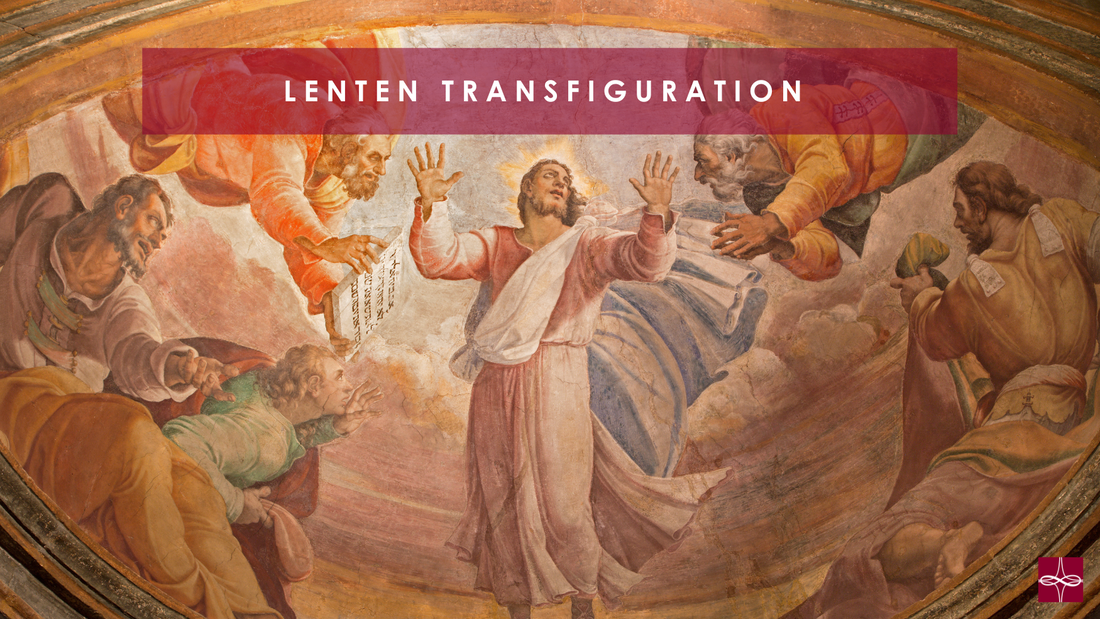

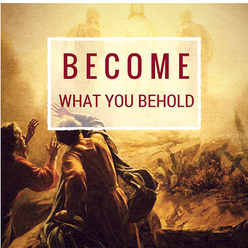

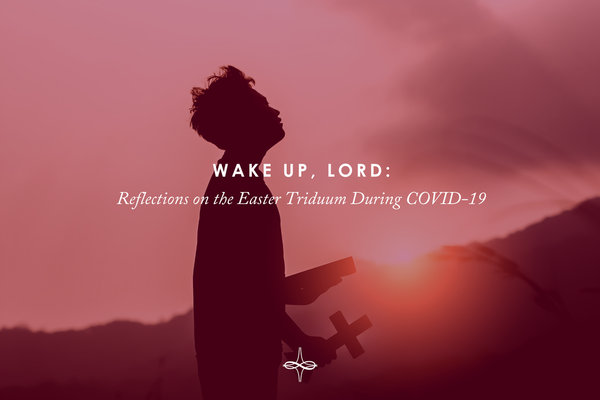

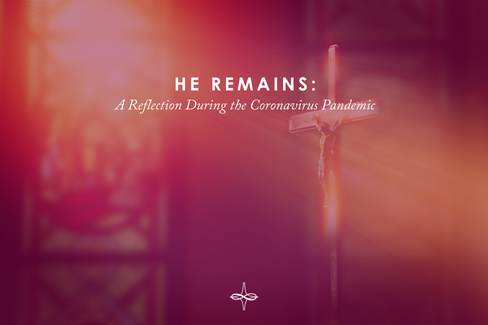

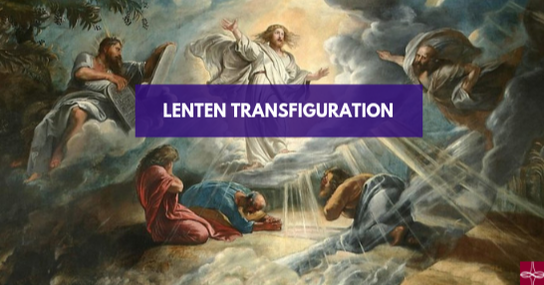



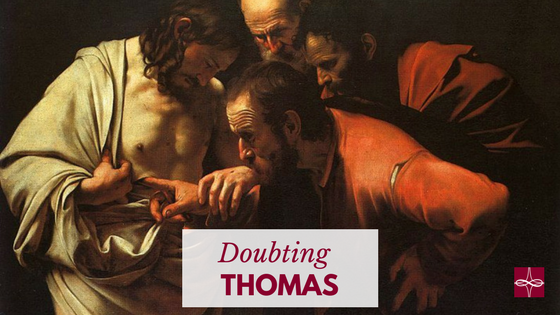



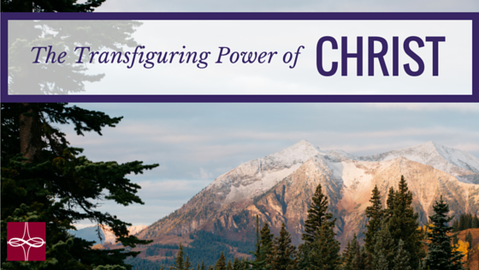
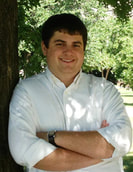
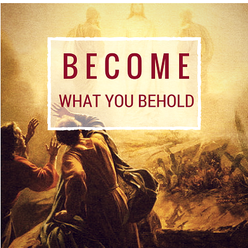
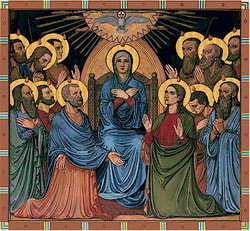
 RSS Feed
RSS Feed